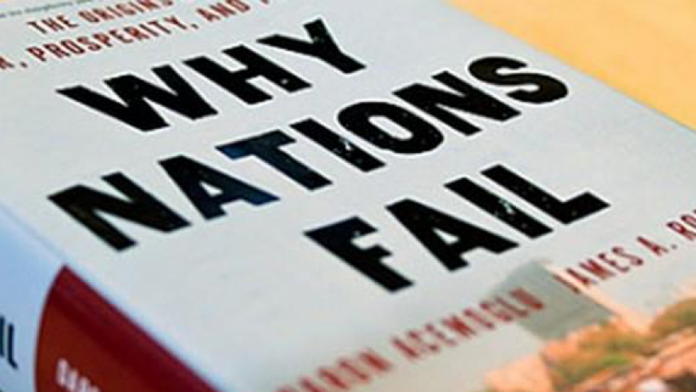Review By: Wazir Zafar Hassan

“Why Nations Fail: The Origins of Power, Prosperity, and Poverty” is a thought-provoking and influential scholarly contribution co-authored by Daron Acemoglu and James A. Robinson. This book was published in 2012 and explores the complex variables contributing to the different outcomes observed among nations, with some experiencing prosperity and others enduring poverty and instability. Acemoglu and Robinson, after extensive research, present a persuasive theoretical framework that examines the influence of institutions on the trajectory of nations. This book’s comprehensive research and careful examination have positioned it as a fundamental contribution to political economics.
The authors have suggested that the primary difference among nations worldwide is their institutional structures. This determines the varying levels of economic prosperity and inequality. The book revolves around two concepts: inclusive institutions and extractive institutions. The writers then explained these terms by relating them to several countries. The countries having inclusive institutions facilitate and promote the active involvement of a diverse range of individuals from various sectors of society. On the contrary, exclusive institutions are defined by their tendency to consolidate power and wealth in the hands of limited people rather than the masses.
The authors argued that inclusive institutions are crucial for encouraging economic progress and prosperity for any country, whereas the presence of extractive institutions in a country results in poverty and growth stagnation.
Inclusive institutions have the following characteristics:
- They enforce property rights and provide a fair, competitive environment.
- They promote investments in emerging technologies and skill development.
- They work on wealth redistribution and the liberation of the means of getting wealth.
On the contrary, the extractive institutions are characterized by:
- They tend to centralize power and wealth in the hands of a few individuals.
- Rather than benefiting the entire population, these systems primarily serve the interests of the few elites who control other institutions.
- These structures are designed to facilitate the extraction of resources from the majority by a minority group.
The book offers many examples of nations that have experienced success or failure due to their institutional frameworks. The authors conduct a comparative analysis of North and South Korea, two regions that were once equal in economic progress but subsequently diverged due to divergent institutional frameworks.
The authors discussed many countries that have implemented inclusive institutions. Here are some examples of countries discussed in the book:
South Korea:
The authors believe that the institutions in South Korea have played a pivotal role in facilitating its substantial economic growth compared to North Korea. South Korea possesses what Acemoglu and Robinson call “inclusive institutions,” comprising representative legislatures, well-functioning public schools, open markets, and robust patent systems.
Japan:
The authors suggest Japan’s institutions have exhibited inclusivity since the Meiji Restoration of 1868. The institutions in Japan facilitated the emergence of a vigorous and innovative economy.
United States:
The writers believe that the institutions of the United States have exhibited inclusivity since the time of the American Revolution. The institutions inside the United States facilitated the emergence of a solid and innovative economy.
Botswana:
The authors suggest that Botswana’s institutions have exhibited notable inclusivity since the nation declared independence in 1966. The institutions in Botswana facilitated the emergence of a robust economy.
Here are some examples of countries with extractive institutions discussed in the book:
North Korea:
The authors claim that the institutions of North Korea exhibit extractive characteristics, where a select group of elites exploits state power to further their interests, often through corrupt practices, rent-seeking behavior, or coercive measures to compel people to work.
Zimbabwe:
In the context of Zimbabwe, the authors argue that implementing inclusive institutions would have yielded more favorable outcomes. However, it is contended that the establishment of extractive institutions under the leadership of Mugabe resulted in limited benefits for the broader people, instead favoring a select group of elites who exercised significant control over the channels of power.
Colonial Latin America:
The authors claim that in colonial Latin America, the prevailing economic institutions were extractive in nature, as they were established to exploit the indigenous population for the profit of the colonizers.
Venezuela and Saudi Arabia:
The authors believe that both Venezuela and Saudi Arabia exhibit extractive institutions characterized by the concentration of power within the hands of elites who utilize state resources to further their interests. These elites thrive through corruption, rent-seeking, and coercive labor tactics.
In addition to the abovementioned concepts of inclusive and extractive institutions, “Why Nations Fail” explains several more significant concepts. These conceptual frameworks aid in clarifying the writers’ assertions regarding the determinants that influence the prosperity or downfall of nations. These key concepts are explained below:
Critical junctures:
The authors claim that some crucial moments in the historical development of a nation, referred to as critical junctures, hold the capacity to influence its future trajectory significantly. These critical junctures encompass significant occurrences like revolutions, wars, or political transitions, which present favorable circumstances for implementing institutional modifications.
Reversal of fortune:
The concept of a reversal of fortune is examined by the writers, who delve into the phenomenon wherein nations that were formerly prosperous may experience a collapse. Conversely, those who were once struggling can achieve prosperity. These reversals are attributed to institutional dynamic shifts and the lack of inclusive or extractive regimes.
The role of technology:
There is a close relationship between the technology and institutions. The authors argued that technological progress catalyzes institutional change. Inclusive institutions encourage technological innovation, whereas extractive institutions hinder technological innovation.
The role of culture:
There is a close relationship between culture and institutions. The authors suggested that culture can influence the institutions, but it is the institutions that determine the ultimate outcome of the progress or decline of a nation.
Political Centralization:
Acemoglu and Robinson also analyze the role of political centralization in forming and progressing inclusive institutions. A strong central government can promote and sustain inclusive institutions, whereas a weak government is more likely to engender extractive institutions.
The lessons given in this scholarly book can be effectively applied to examine contemporary political environments in developing nations to inspire economic advancement. Countries with extractive tendencies should establish inclusive institutions, combat corruption, allocate resources to education and healthcare, enhance political engagement, and learn lessons from historical examples.
In a nutshell, the authors established two distinct categories of institutions: inclusive and extractive. Inclusive institutions are famed for their commitment to enforcing property rights and equal opportunities, promoting investment, and ensuring equitable distribution of political power. In contrast, extractive institutions have a concentration of power and wealth in the hands of a few individuals. These institutions allow the few to exploit resources for personal gains. The authors believe that inclusive institutions are essential for promoting economic progress and prosperity, whereas the dominance of extractive institutions tends to result in inequality and stagnation of growth.
















